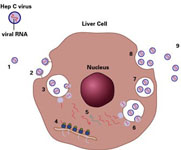Newly identified monoclonal antibodies may help make Hepatitis C vaccine

Washington, Sept. 4 : Scientists from Nottingham University have discovered monoclonal antibodies that may help make a successful vaccine for Hepatitis C, the single biggest cause of people requiring a liver transplant.
Hepatitis treatment is expensive and only successful in half of patients, said the scientists while presenting their findings at the Society for General Microbiology's 161st Meeting at the University of Edinburgh, UK, which runs from 3-6 September 2007.
Untreated or unresponsive patients could go on to develop cirrhosis of the liver, with life affecting consequences or the need for a transplant, they said.
The researchers claimed that they had identified antibodies that could successfully prevent infection with many diverse strains of Hepatitis C virus in laboratory models.
"The clinical potential of this work cannot be overstated. Historically, successful vaccines against viruses have required the production of antibodies, and this is likely to be the case for Hepatitis C virus," said Dr Alexander Tarr from the Virus Research Group at the University of Nottingham.
"Identifying regions of the virus that are able to induce broadly reactive neutralising antibodies is a significant milestone in the development of a HCV vaccine, which will have distinct healthcare benefits for hepatitis sufferers, and could also help us design vaccines for other chronic viral diseases such as HIV," he added.
Hepatitis C virus infects 180 million people worldwide. Infection with the virus can lead to liver cancer, and is the most common reason for liver transplantation in both the UK and the USA.
The researchers said that they were trying to improve the success rates of liver transplantation by using the antibodies they have identified.
"We are also currently exploring the possibility of improving liver transplantation success rates by passively infusing people with these antibodies" says Dr Tarr.
"We are also using the information gained by identifying and characterising the antibody responses to Hepatitis C virus to design new ways of making vaccine candidates. If the antibodies we have discovered can be reproduced by vaccination, control of the disease might be possible," he added. (With Inputs from ANI)